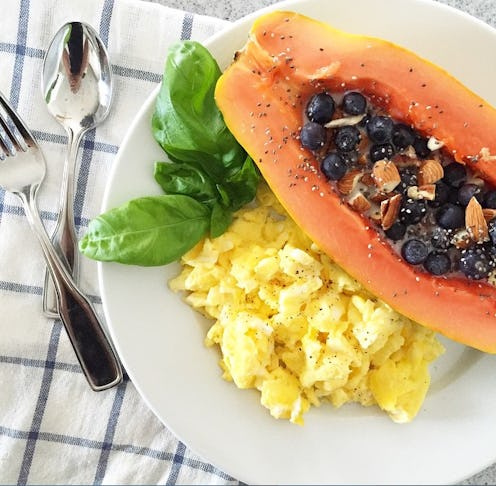Life
What Is The Whole 30 Diet?

It seems like every day there's a new diet craze out there that takes the world by storm. Case in point: The Whole 30 diet, which seems to have popped up out of nowhere and taken over Instagram overnight. If you're like me, you can't keep up with all these new diets you "have to" try. So what is the Whole 30 diet exactly, and how can you figure out if you should give it a try? I'm going to break it down for you so you can decide whether it's worth it or not for yourself.
What It Is:
Whole 30 is a diet that requires you to cut out all dairy, sugar, alcohol, grains, soy, legumes and processed foods for 30 days. It was conceived by Dallas and Melissa Hartwig, two licensed nutritionists in Salt Lake City, in 2009.
What It Does:
People who participate in the Whole 30 diet have reported experiencing health benefits ranging from better skin, to increased energy, to reduced cholesterol, and more. People who've done the diet also emphasize the fact that it really helps you reconsider your relationship with food.
What It Doesn't Do:
Although there have been people who have reported they lost weight on Whole 30 (and honestly you probably will drop a few pounds because you're cutting out so many foods), it doesn't necessarily market itself as a weight loss diet. This means it's a food plan that's better for those who want to focus on non-scale related benefits
So this is not the diet if you're trying to lose a significant amount of weight, but rather if you want to focus on other, non-scale related benefits.
What Are Some Pros and Cons of Participating in Whole 30?
Pro: It's only a 30-day commitment.
So you don't have to give up alcohol forever.
Con: It's not sustainable.
It's more of a temporary fix versus a permanent lifestyle change.
Pro: You don't have to count calories.
All you have to do is eat foods that are Whole 30-approved, and avoid foods that aren't.
Con: It's really restrictive and hard.
What's more, there are a lot of nutritionists out there don't agree with many of its guidelines (more on that in a bit). David L. Katz, M.D. told Business Insider , "The grouping [of off-limits foods] is both random, and rather bizarre from a nutrition perspective... If the idea is good nutrition, cutting out whole grains and legumes is at odds with a boatload of evidence."
Pro: You can have coffee...
Con: ...But you can't sweeten it with anything (not even stevia).
You can't add any sort of creamer, either — even Paleo coffee creamer. Ugh, can I live?
Pro: All your meals will be super Instagram-worthy.
Con: You really have to put a lot of thought into your meals.
Spontaneous happy hours or dinner with friends will likely be a thing of the past.
What Do Experts Think?
On the one hand...
It's not a secret that added sugar is bad for you, and that you should limit how many processed foods you eat. Furthermore, the merits of consuming dairy have been long debated.
On the other hand...
Many nutritionists push back against Whole 30 simply because it's so restrictive. Nutritionist Keri Glassman told Elle, "30 days is a long time and can be very restrictive, especially if you have to start over." She's talking about how, if you cheat or slip up during your 30 days, you have to start over from day one. Yep. Moreover, many experts argue that although some of the banned foods are unhealthy, some of the restricted foods are actually good for you, and by cutting them out you're actually doing yourself a disservice. For instance, Glassman said, "Legumes provide a really great way to get in vegetarian meals," and added, "I don't think you should drink milk all day, but there's a really good place for Greek yogurt." Also, studies have shown that foods like yogurt and legumes are vital for healthy bacteria in your intestinal tract. Finally, doctors worry people might end up binging once the 30 days are over.
What's the b=Bottom Line?
Ultimately, although it definitely has its drawbacks, there are a ton of people who swear by Whole 30. If you feel like you're a slave to sugar, it might be worth it to give it a try. Some doctors recommend even easing into it with a modified version of the Paleo diet, rather than plunging right into Whole 30. After reading all of this information (and, I'll admit, looking at all that Whole 30 food porn in Instagram), I kind of want to give it a try, but, like, I'd do a Whole 7 for a week and call it done.
Images: aubreylaidlaw/Instagram; Giphy (6)